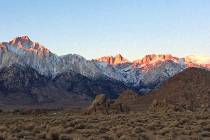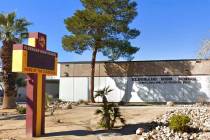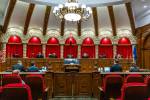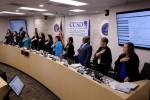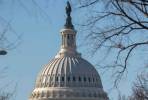Group backs raising taxes
Nevada's tax structure is fundamentally unfair, burdening the poorest residents the most while letting the rich and big business largely off the hook, according to a new study by a local liberal coalition.
The report, released Monday by the Progressive Leadership Alliance of Nevada, calls for a top-to-bottom overhaul of taxation in the state to spread the tax burden in a manner it said would be more equitable.
Chief among its proposals are a new tax on business profits and increasing the amount paid by mining companies. Those and other reforms would generate nearly $1.3 billion for the state's general fund each year, monies PLAN says are needed to shore up education and state services.
The tax system relies on "balancing the state budget on the backs of those who can least afford it while shielding some of the state's biggest, and most profitable, businesses from any meaningful taxation whatsoever," the report states.
As the Legislature prepares to convene facing a massive budget shortfall because of plummeting revenue, the group says it is time to increase taxes rather than continuing to cut state services that it says are already insufficient.
Whether there will be political support for such ideas stands to be the major question of the legislative session, which begins next month. On Thursday, Gov. Jim Gibbons is scheduled to present his budget recommendations, which legislators will then build from for the next several months.
State revenue in Nevada is largely dependent on sales and gaming taxes. The former hit poor families the hardest, while the latter are highly unstable, PLAN says.
According to an analysis for the group by Robert Ginsburg, director of the Chicago-based Center on Work and Community Development, the poorest 20 percent in Nevada pay an average of 8.3 percent of income into the state general fund, while the wealthiest 1 percent pay just 2 percent of income, on average.
Meanwhile, certain industries are barely taxed at all, such as construction, which makes up 9.3 percent of the state's gross production while paying 1.1 percent of its taxes, according to the report.
Services, manufacturing and mining similarly pay disproportionately low rates, while entertainment and sales, both wholesale and retail, pay much more than their share in taxes, the report concludes.
To remedy that, the report suggests a tax on businesses' net profits, which most other states impose. PLAN calls for a 5 percent tax on businesses with profits of $50,000 to $100,000 and a 7 percent tax on profits of $100,000-plus, which would bring in an estimated $194 million in revenue.
Those rates would be at or below the business tax rates of most neighboring states, the group reports.
The massive multinational mining corporations that are doing booming business in the gold mines of Northern Nevada deduct everything from insurance to marketing from their gross production revenue, so that some years they report zero net proceeds, the report finds. The mining industry, according to the report, experiences an effective tax rate of 0.5 percent.
By tightening the rules on deductions, the state would generate an additional $141 million annually from mining taxes, the report states.
Other recommendations in the report include:
• Doubling the modified business tax, from 0.63 percent to 1.26 percent, for $279 million in annual revenue;
• Requiring casinos to pay sales tax on comped meals, generating $140 million per year in taxes;
• Increasing the hotel room tax by 3 percentage points, a measure proposed by the teachers union and approved by voters in Clark and Washoe counties, which would bring in an estimated $125 million annually;
• Charging a 3 percent tax on capital gains, interest and dividends over $200,000 per year, raising $380 million.
The last suggestion would require amending the state constitution, which would take several years as it requires a statewide referendum.
The group called for instituting a state income tax but didn't say how it should be structured. That too would mean changing the constitution.
All the other proposed changes could be enacted by the 2009 Legislature. While the state's mining tax rate is constitutionally mandated, the deductions PLAN proposes eliminating are statutory.
The group's recommendations serve to highlight the magnitude of the gulf the Legislature will face between expected revenues and the money needed to maintain state government at its current levels.
With that gap estimated at $2.4 billion over the two years of the budget, an increase in taxes of $1.26 billion per year would more than cover it.
But without constitutional amendments, the recommendations could generate just $880 million annually, or $1.76 billion over the biennium.
Cara Roberts, spokeswoman for the Las Vegas Chamber of Commerce, said the group's report failed to appreciate the importance of a vibrant, low-tax business environment to reviving the state's economy.
"This report seems to be about trying to punish business, as opposed to recognizing that if we want the community to succeed, the business community needs to be able to succeed and be prosperous and create jobs," Roberts said.
The chamber is willing to consider that the state might need more revenue, but first there must be a serious discussion of fundamental spending reforms, particularly in the areas of public employee salaries and benefits, she said.
The president of the Nevada Mining Association, Tim Crowley, commended PLAN for looking for solutions to the state's financial problems. The mining industry wants to come to the table along with others to "find a solution that's fair, equitable and broad-based."
But that solution should not rely on singling out mining, Crowley said. PLAN's calculations underestimate mining's contribution to Nevada's tax base, half of which is paid to local jurisdictions rather than the state general fund, he said.
The group's analysis of mining companies' deductions misunderstands the tax's intent, he said. Mining companies also contribute to the tax base through sales and other taxes.
Monday's report constituted a mirror image of a study released last week by a conservative think tank. The Nevada Policy Research Institute recommended ways the state could cut the budget to avoid tax hikes, including eliminating state agencies.
NPRI spokesman Andy Matthews said if PLAN believes some taxes are unfair, the solution ought to be to eliminate those taxes, not impose new ones. Raising taxes on people and businesses, especially during the current severe recession, would only hurt Nevada's economy, he contended.
"In an economic climate such as we face today, raising taxes is about the worst thing you can do," he said. "It puts an undue burden on families and businesses at a time when they can least afford it."
Contact reporter Molly Ball at mball@ reviewjournal.com or 702-387-2919.
Download PDF of PLAN's report














